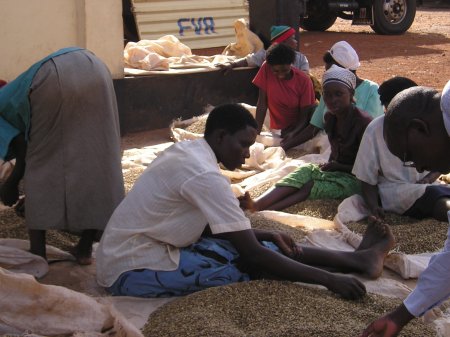Local Project Management
The Local Management Unit (LMU) consists of the following:
- Mr. Fred Mwesigye (Part-time National Project Coordinator and Commissioner, Ministry of Tourism, Trade and Industry)
- Ms Deborah Kyarasiime (Project Assistant)
- Mr Chris Baine (Full-time Technical Advisor)
- Mr Apollo Kamugisha (Associate Project Coordinator for Coffee sector)
- Mr Hans Muzoora (Associate Project Coordinator for Cotton sector).
The host Ministry for the project is the Ministry of Trade, Tourism and Industry (MTTI). The project office is located in the Farmers’ House, Kampala in which the headquarters of the MTTI is located.
The key players include the two commodity boards: Uganda Coffee Development Authority (UCDA) and the Cotton Development Organisation (CDO).
The Uganda WRS Model
The progress made in Uganda up to now includes the following:
- A Warehouse Receipt Systems Bill has now been passed in Uganda to provide a regulatory framework within which the system can develop. To facilitate its passage through ensuring understanding of the concept as well as garner support behind the Bill, workshops were organised targeting key stakeholders and parliamentarians representing the Sessional Committees on agriculture, finance and trade. Two study tours to Tanzania were also organised for stakeholders to enable them to acquaint themselves with how the WRS works, since Tanzania has made more progress in terms of piloting the systems for coffee and cotton.
- A market information system (MIS) has been established in Uganda, initially for the coffee sector. The MIS is expected to be sustainable due to its reliance on available capacity within UCDA on information collection and dissemination. Information dissemination is via local media - newspapers and broadcasting bulletins. Price information on coffee (and later to include cotton) is also being disseminated via SMS messaging. A private service provider – True Africa - is providing this service to UCDA. The information provided covers prices of Arabica and Robusta coffee in the main coffee producing districts.
- Training in coffee quality assurance has been provided to, especially coffee producers. The main resource persons were from the UCDA.
The outcomes of the WRS pilots are reported below per commodity.
Progress Made in Coffee Sector Pilot

Coffee is Uganda's premier export commodity, accounting for up to 55% of the countries foreign exchange earnings. Over 90% of Uganda’s coffee is Robusta, and comes from the Lake Victoria zone. Arabica is mainly grown near Mt Elgon in the East. Coffee production is mainly by smallholder farmers.
The key features of the Uganda Coffee WRS are:
- Certified Warehouse Operators include Bugisu Cooperative Union, Muhame Cooperative Society and Banyankole Kweterana Cooperative Union.
- A collateral management company – Cotecna, has been appointed to issue Warehouse Receipts and to manage deposited stocks.
- Depositors include farmer groups, including those under NUCAFE, Cooperative Societies, Area Cooperative Marketing Enterprises and some medium-scale traders.
- Allied Bank is participating in the WRS Project. However, the coffee deposits received during the two pilots were sold directly after depositing and did not require any inventory-backed bridging finance.
- Most of the coffee was sold directly to exporting companies before processing
- Robusta deposited in the designated warehouse in Mbarara (Western Uganda) was sold by auction through the Uganda Commodity Exchange.
- Volumes deposited since the launch of the WRS project pilots have been small.
Further farmer sensitisation, training and mobilizing programmes have been planned for the Central and South-Western regions, focusing on Ntungamo and Bushenyi areas, to ensure improved uptake of the WRS for the coming coffee season.
Progress Made in Cotton Sector Pilot
Although cotton is produced widely in Uganda, most production is concentrated in the Northern and Eastern regions of the country. Cotton is produced mainly by smallholder farmers. Over 90% of the cotton produced in Uganda is for the export market.
- The cotton pilot involves two main farmer groups, one from Kasese and the other from Bushenyi area. The societies together have over 120 farmers.
- Most of the participating farmer groups belong to Nyakatonzi Co-operative Union (NCU). The NCU has been reported to be purchasing new gin stands in anticipation of increased deposits.
- NCU is providing toll ginning services to the farmer groups as well as warehousing facilities.
- As with the coffee pilots, COTECNA is providing collateral management for the cotton pilots.
- By end of February 2006, one month into the pilot, over 100,000 kg of seed cotton had been deposited.
